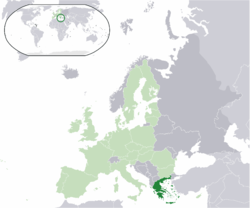Divided Greece Torn By Hard Times, Austerity
By SETimes
By Andy Dabilis
With Greece running out of cash and time, Prime Minister Antonis Samaras’ shaky coalition government faces its most crucial test on Wednesday (November 7th) when a 13.5 billion-euro spending cut and tax hike plan goes to parliament during a planned strike and protest by labour unions.
That comes as the New Democracy Conservative party leader’s partners, the PASOK Socialists and tiny Democratic Left, are facing rebellions in their ranks against the new austerity measures demanded by the EU-IMF-ECB Troika in return for releasing a long-delayed 31.1 billion-euro loan installment.

Samaras has warned that Greece will run out of money by November 16th unless it agrees to the demands that are being resisted by his partners.
If that happens, there could be nowhere for voters to turn. Panayiotis Lafazanis, parliamentary spokesman for the major opposition Coalition of the Radical Left (SYRIZA) party, told ANT1 TV that even if new elections are held and it wins that, “we are not ready to govern.”
The Troika talks behind him, Samaras is trying to keep his four-month-old government from breaking apart in the face of social unrest. Greece has undergone two and a half years of austerity since a first series of 109 billion euros in rescue loans began, but the economy is getting worse.
New estimates show the general debt could hit 189.1 percent of GDP next year, worse than the 182.2 percent estimate. The Troika wants it reduced to 120 percent by 2020, which many analysts said seems unlikely.
With unemployment at 24 percent — 55 percent for those under 25 — and 68,000 businesses shuttered since austerity began, the numbers don’t add up for the government, and the tension is making some members of PASOK and the Democratic Left break rank and say they will vote against the package.
“The measures are going to pass but then they have to be implemented. If the Democratic Left decides not to vote for them, the government might find itself in a difficult position,” Antonis Klapsis, head of research for the Konstandinos Karamanlis Institute for Democracy, the New Democracy think tank, told SETimes.
“If the measures are not voted [through], the government will have to resign because it won’t have a majority. We probably even couldn’t hold new elections because there isn’t enough money,” he said.
Stock prices are falling, stores and restaurants closing, extremism and crime rising, and intermittent strikes as the government desperately tries to keep the economy from collapsing while trying to convince a skeptical public to go along with more sacrifice.
“The problem is that no one believes this is the last round of austerity and no one believes the government or the Troika and it’s clear we can’t go on like this,” George Tzogopoulos, a research fellow at the Hellenic Foundation for European and Foreign Policy, told SETimes. “Even if the measures pass, the real challenge is to implement reforms and it seems they are not going to be able to do that.”
Eurozone finance ministers are due to meet November 12th to decide whether to release more funding for Greece.
Despite rising tension, Finance Minister Yannis Stournaras said “the mood was good,” and he said the budget package will pass. The government technically holds 177 votes in the 300-member parliament, but some projections show only 153 members will support the package.
“The government will pass these measures with a small majority … but it can’t continue forever,” Stratos Georgoulas, a sociology professor at the University of the Aegean on the island of Lesbos, told SETimes.
